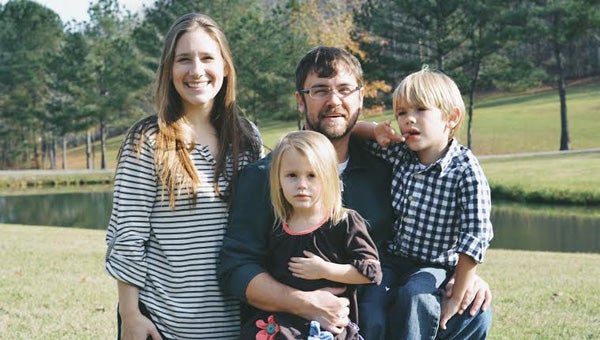The things people say (religion)
Published 11:04 am Friday, April 22, 2016

Family picture: Angela, Jeremy and Lena (3) and Owen (6) Smyly are advocates for using appropriate language with children with special needs.
By Chanel Bingham
As mentioned in last week’s article, April is Autism Awareness Month. There are many families locally and beyond who are affected by this diagnosis and in need of our support, compassion and understanding.
I must admit that I have very little knowledge on the subject, but I am willing to learn.
In hopes of continuing and building upon the conversation we started last week, I have asked Angela Smyly to share some thoughts with us about the language we use in communicating with those children who have special needs.
Angela’s 6-year-old son Owen was diagnosed with autism at two and a half years old, and she has been his biggest advocate from day one.
While Owen carries this diagnosis, he is more than just a child with autism. He was created with amazing gifts and talents, but we may miss the treasures he has to offer if we are unwilling to listen, learn and open our hearts to those individuals who are different than us.
There is no normal
When I first realized that Owen had special needs, I became hypersensitive to hurtful language regarding people with special needs.
It was like all of a sudden I heard it everywhere, and I was appalled. I still hear it, and I’m still appalled. I can’t help it. I want to believe as human beings we are evolving and learning from each other even though most everything around me suggests otherwise.
I’ve been asked, “What’s wrong with him?” Instead, a more appropriate way of learning more about someone would be to start with asking his name or telling him you like his shirt or his hair cut.
I promise, anything you need to know will be answered by simply starting a conversation and saying hello.
More than once when I’ve told someone Owen has autism, their response is, “I’m sorry.” I know you simply mean that it must be hard for me sometimes, so please just say that. I’m not sorry, so you shouldn’t be either.
Another common response I get is, “He doesn’t look like he has autism.” Instead, you could say, “He’s so handsome,” or comment on one of his many other wonderful attributes and strengths.
Once someone told me, “He’s almost as good [at kicking the ball] as the normal kids.” Instead, he could have simply said, “Owen, you are good at kicking the ball!”
We don’t use the term “normal” to describe our peers without special needs; we say “typically developing” or “neuro-typical.” There is no normal.
Now, this is a hard one: The misuse of the word “retard” is despicable. This word is not a synonym for dumb, stupid, crazy, ugly, gross, nuts or insane, etc. So stop using it like that; just stop.
I always thought that if anyone called Owen that word I would probably end up in jail, but we all surprise ourselves now and then.
Last summer I was in the backyard with my kids, and Owen was vocally stimming (making vocal sounds; repeating vocal sequences). I could hear a group of older boys (middle school age) talking and playing ball over the fence in the yard behind ours.
One boy mocked the noises Owen was making, and they all laughed. Then it happened; one of them yelled, “Hey, retard.”
I can’t share what my first thought was on how I wanted to respond because it’s too evil. I can’t share my second thought either; I’m trying to keep it positive!
I looked at Owen. He was unfazed. Even though he understands a good bit of what’s said to him, he doesn’t know that word. He didn’t know they were being mean or that they were even talking to him, so I couldn’t react (even though I wanted to).
I needed to be like him: unfazed.
I thought for a few days about how and if I should address it. But we were fairly new to the neighborhood, and I didn’t even know which kid said it or if he was the one that lived there, so I didn’t do anything.
Last fall they moved.
Parents: Teach your children to be kind. Take opportunities that may seem uncomfortable, for fear of saying the wrong thing, to show them how to engage and interact with their peers that may be different than them in a respectful and considerate way.
Here are some things to remember when speaking to an individual with special needs:
•Speak directly to the individual with special needs, not to an interpreter, parent or caregiver, even if the individual has limited communication skills.
•Ask before helping.
•Extend or refrain from physical touch and hugs the same way as you would to a person the same age without special needs.
I’m sure that most of the time these types of responses and comments are not intended to hurt or anger, but unfortunately, most of the time they do.
–Angela Smyly
“Let the words of my mouth and the meditation of my heart be acceptable in your sight, O LORD, my rock and my redeemer.” Psalm 19:14
Chanel Bingham is a freelance writer, blogger and public speaker. She resides in Thorsby with her husband and four children. You can visit Chanel at www.thepolishedcanvas.com or on Facebook at “The Polished Canvas.” Her column publishes each week.



